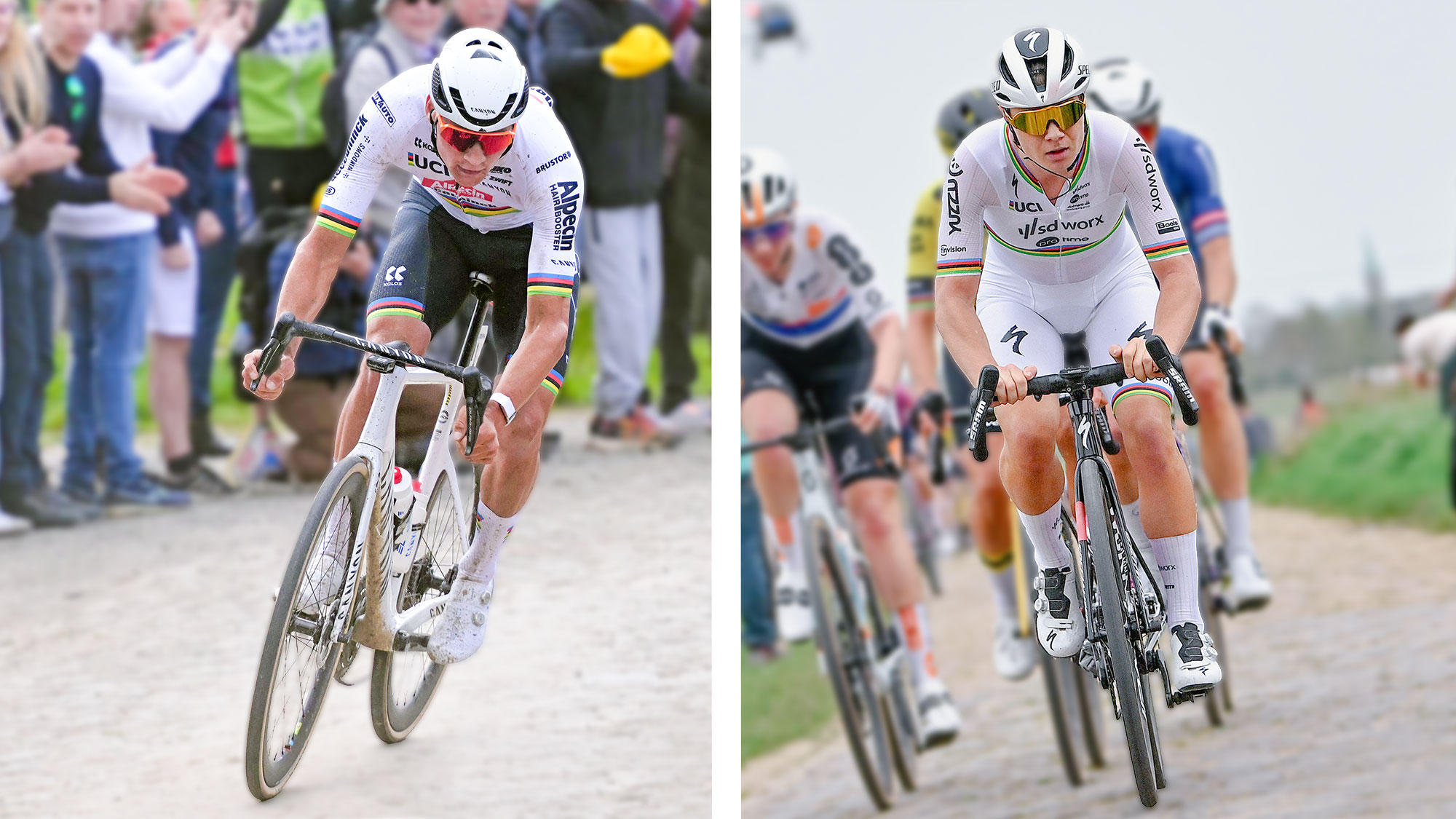
As the races do year after year, Paris-Roubaix and Paris-Roubaix Femmes drew the cobbled Classics season to a close in spectacular fashion at the weekend.
The pair of races, run over the cruel cobblestones of France's Nord department, delivered pain, emotion, controversy, and joy in equal measure as Mathieu van der Poel (Alpecin-Deceuninck) and Lotte Kopecky (SD Worx-Protime) triumphed in Roubaix's famous Vélodrome André-Petrieux.
In Sunday's men's race, it was Van der Poel who defended his title with a stunning 60km solo attack, once again leading home an Alpecin-Deceuninck one-two ahead of Jasper Philipsen after a day of unmatched teamwork.
A day earlier, the fourth edition of the women's race culminated in a velodrome sprint and the now-familiar sight of world champion Kopecky raising her arms in triumph after outpacing a small group of some of the strongest women in the peloton.
But, as ever at the Hell of the North, there were far more stories to tell than those of the winners. After all, these are races filled with hundreds of personal epics.
Our Cyclingnews team on the ground – experienced reporter Stephen Farrand and Paris-Roubaix regular Dani Ostanek – and our women's editor Kirsten Frattini, have come together to analyse both races in detail to summarise the big talking points from an epic weekend of racing.
Before turning to the Ardennes Classics, there's far more to come from Roubaix, including tech roundups, final thoughts from resident columnist Fabian Cancellara, and a top-quality gallery of the racing action. But first, read on for 10 conclusions from the 2024 men's and women's Paris-Roubaix.
Mathieu van der Poel – measuring greatness
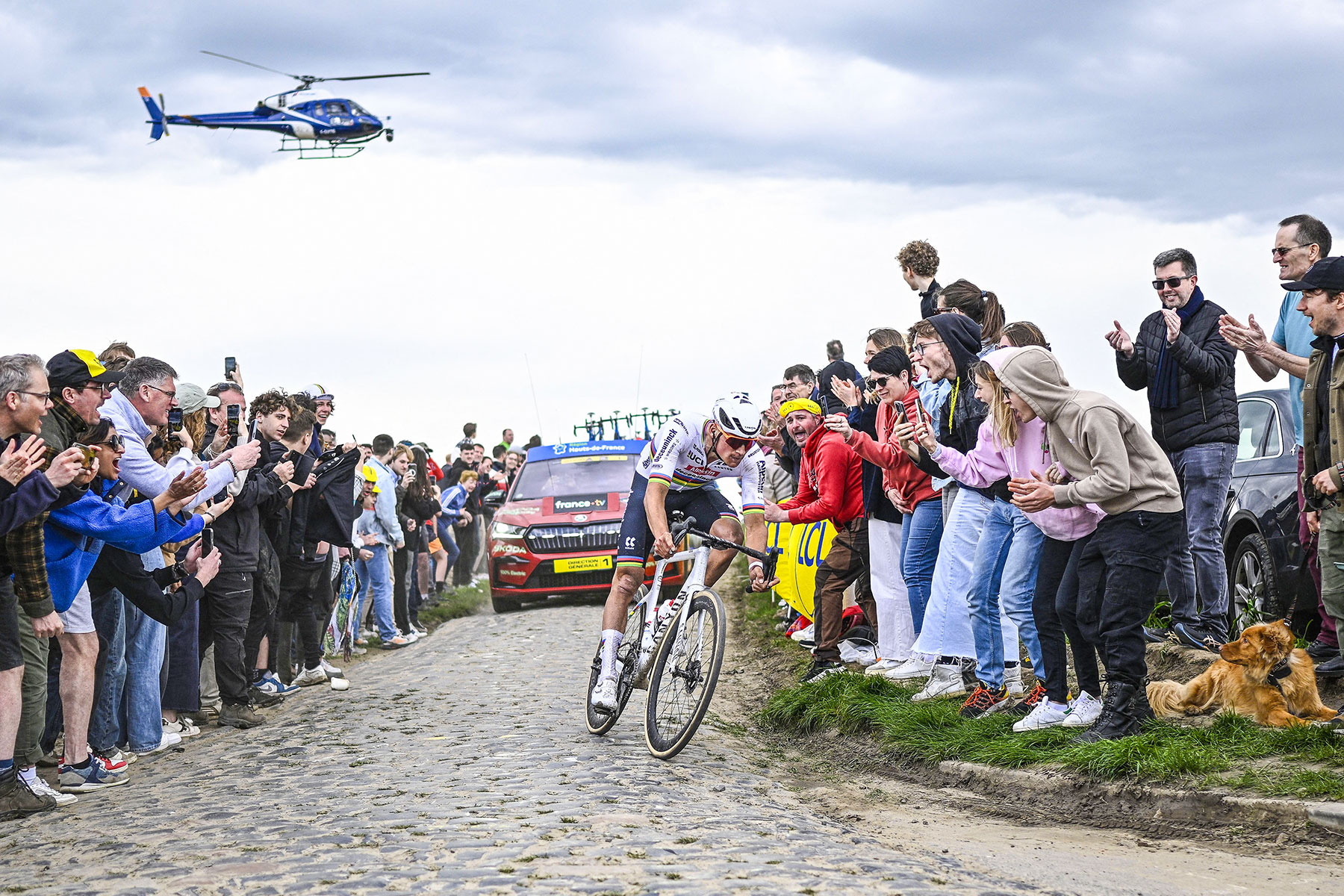
If he wasn't already considered as such, with a world title and four Monument victories to his name among a plethora of other achievements, then Mathieu van der Poel is surely now among the legends of cycling history.
After last week equalling the all-time Tour of Flanders win record, this weekend saw the Dutchman take his Monument wins tally to six – leapfrogging the likes of Bernard Hinault and Paolo Bettini as well as his friend and sometime rival Tadej Pogačar.
He now stands alongside names such as Johan Museeuw, Alfredo Binda, and Francesco Moser on six and within striking distance of Fausto Coppi, Sean Kelly, Tom Boonen, and Fabian Cancellara.
There are plenty more statistics to throw around, too. Van der Poel raced to the finish a full kilometre an hour quicker than any other winner in history, and his three-minute winning margin is the fifth largest of the past 100 years.
However, it's about more than the numbers and facts. Van der Poel's win – which we all knew was coming well before he even turned a pedal in anger in Compiègne, something almost unprecedented at a race such as Paris-Roubaix – was the most dominant in a generation.
When the time eventually comes to look back on his career, it will surely stand as one of the memorable performances of this racing era, of Paris-Roubaix history and as one of the defining moments of his time on the bike.
In the post-race press conference, Van der Poel said that the performance was "close" to his level at the Glasgow Worlds last summer. It will certainly stand alongside it as one of the iconic rides of his career, and there will no doubt be plenty more left to come. (DO)
SD Worx 'finally' taste victory
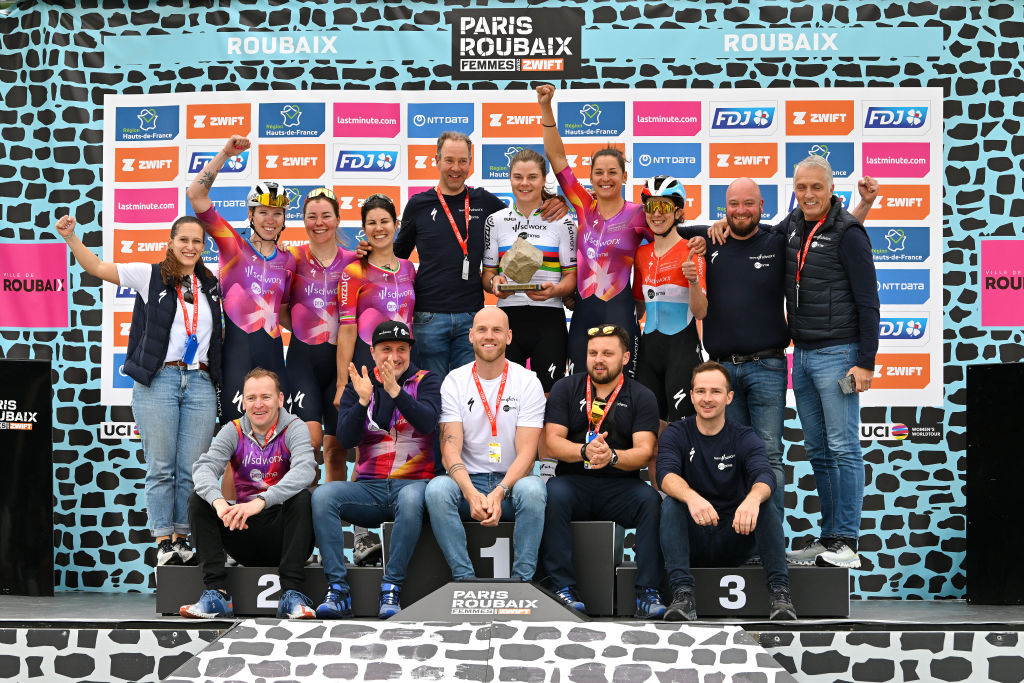
It's been a few years of waiting but SD Worx-Protime have 'finally' filled a rare gap in their palmarès. The Dutch team has swept all before them in recent years including a phenomenal 62-win season in 2023, but after three editions of the Hell of the North, glory at Paris-Roubaix Femmes had eluded them.
That all changed on Saturday afternoon, however, as world champion Lotte Kopecky stormed to victory from an elite group of contenders in the Roubaix velodrome, showing off her pristine rainbow stripes on the line after upgrading on her second place two years ago.
SD Worx have reigned at the top of the world rankings for the past three seasons and with 14 wins already in 2024, they show no signs of slowing down. Kopecky alone has five of them, even if she won't admit to being the best rider in the world right now.
She attacked over and over on the pavé of the north, finally provoking the vital selection at the front on the Camphin-en-Pévèle at 20km to go. With top sprinter Lorena Wiebes lurking in the next group, she could afford some rest on the run to the velodrome – a tactical triumph – before going long in the final sprint to sweep to victory.
SD Worx may have already won almost everything there is to win, and they'll keep on winning, there's no doubt about that, but now they can enjoy another triumph at the biggest race they had missed previously. (DO)
The beauty of the finish in the velodrome
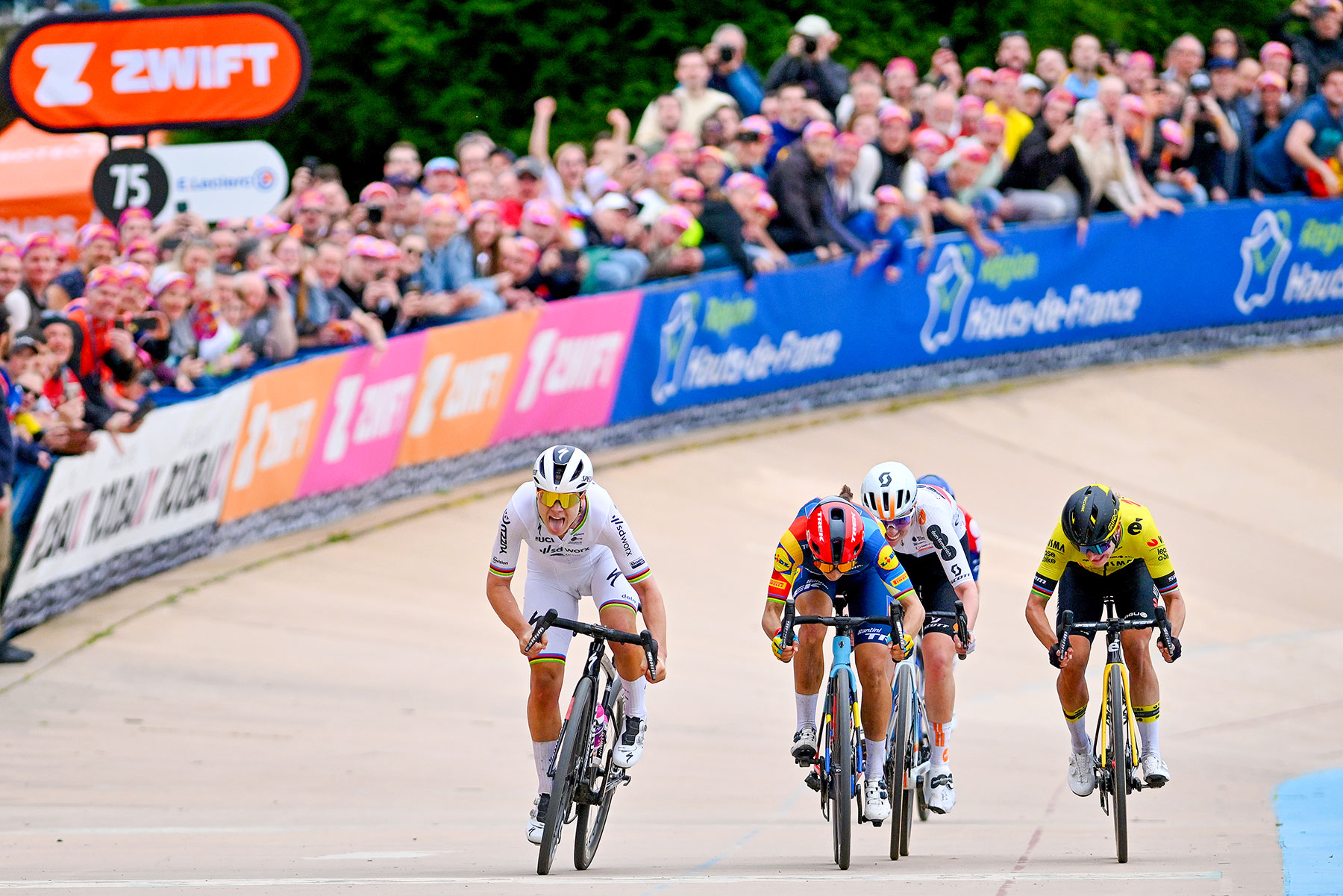
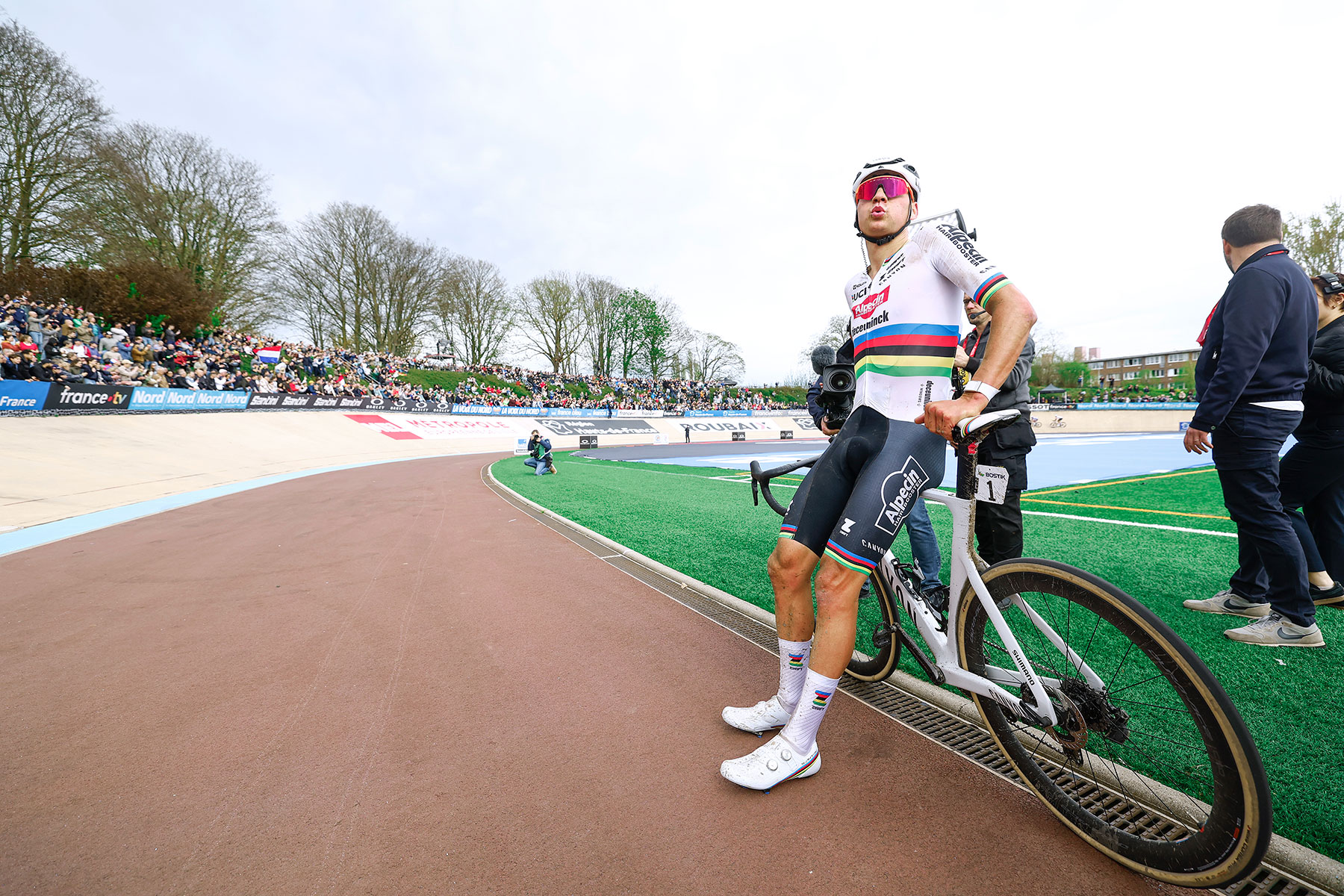
No one would ever suggest that Roubaix is one the beauty spots of France, but for professional cycling fans the town in northern France hosts the finish of Paris-Roubaix, one of the wonders of the cycling world. It’s a cycling Mecca, a temple to the history and beauty of our sport.
The concrete velodrome is crumbling and decrepit in parts, but it somehow retains the mystique accumulated year after year of Paris-Roubaix finishing on the track. It is just the same as when Jorgen Leth filmed his documentary in 1976 and will hopefully stay the same for years to come.
Standing in the track centre at the weekend for the finish of the women’s and men’s races was breathtaking. The hairs stand up on your neck as the riders enter the velodrome and then complete a lap and a half before they celebrate victory.
There is nothing like it. You are immersed in the race like no other moment of the season. The race revolves around you better than a spatial stereo effect. Apple’s new Vision Pro Virtual display goggles can never recreate a similar visual or emotion.
This year we got to experience both of the Paris-Roubaix finish scenario: the breathtaking thrill of Lotte Kopecky coming from behind to win a small group sprint, then 24 hours later Mathieu van Poel celebrated his absolute dominance by riding around the velodrome in triumph and winning alone.
Tom Pidcock described the effect of racing Paris-Roubaix at high speed “as if you’re on drugs”. Watching the finish from the track centre was equally as intoxicating and left us on a high at the end of the cobbled Classics. (SF)
Could Lidl-Trek have used former winner Longo Borghini?
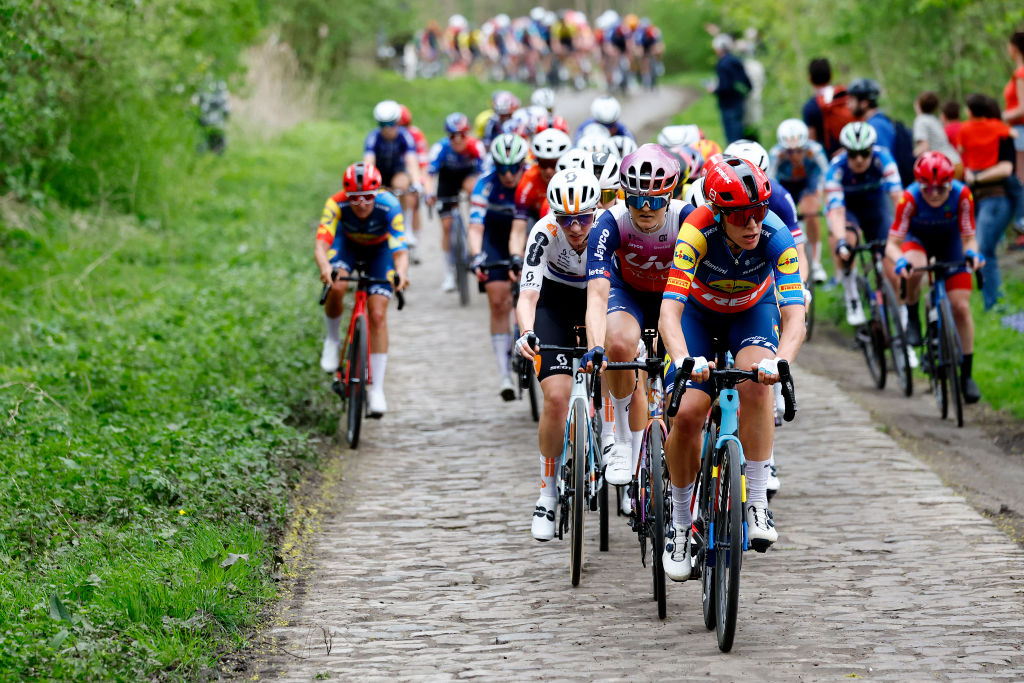
There was some surprise earlier in the week when Lidl-Trek opted not to name 2022 Paris-Roubaix Femmes champion and last week's Tour of Flanders winner Elisa Longo Borghini to their squad for Saturday's race.
With 2021 winner Elizabeth Deignan out injured, a spot in the six-woman squad was up for grabs and who better to step in? However, the Italian and her team stuck to the plan of focusing on the Ardennes.
Instead, the team lined up in Denain with a still-impressive squad which could count on former world champion Elisa Balsamo as well as Ellen van Dijk and Lucinda Brand, among others.
The strength in depth was clearly on show on the cobbles, with race MVP candidate Van Dijk a constant at the head of the race, driving the peloton and then working hard for Balsamo in the latter stages.
In the end, the Italian came away with an emotional second place in the final sprint, having chased back on after being dropped on Camphin-en-Pévèle, as Van Dijk took sixth.
On the day, there wasn't much more the team could have done to win, having placed two women in the six-rider lead group. How much difference the presence of Longo Borghini might have made is unknowable. But, had she also been racing, might Lidl-Trek instead be celebrating a third victory in four years? (DO)
More chicanes and better safety marginal gains make for better racing
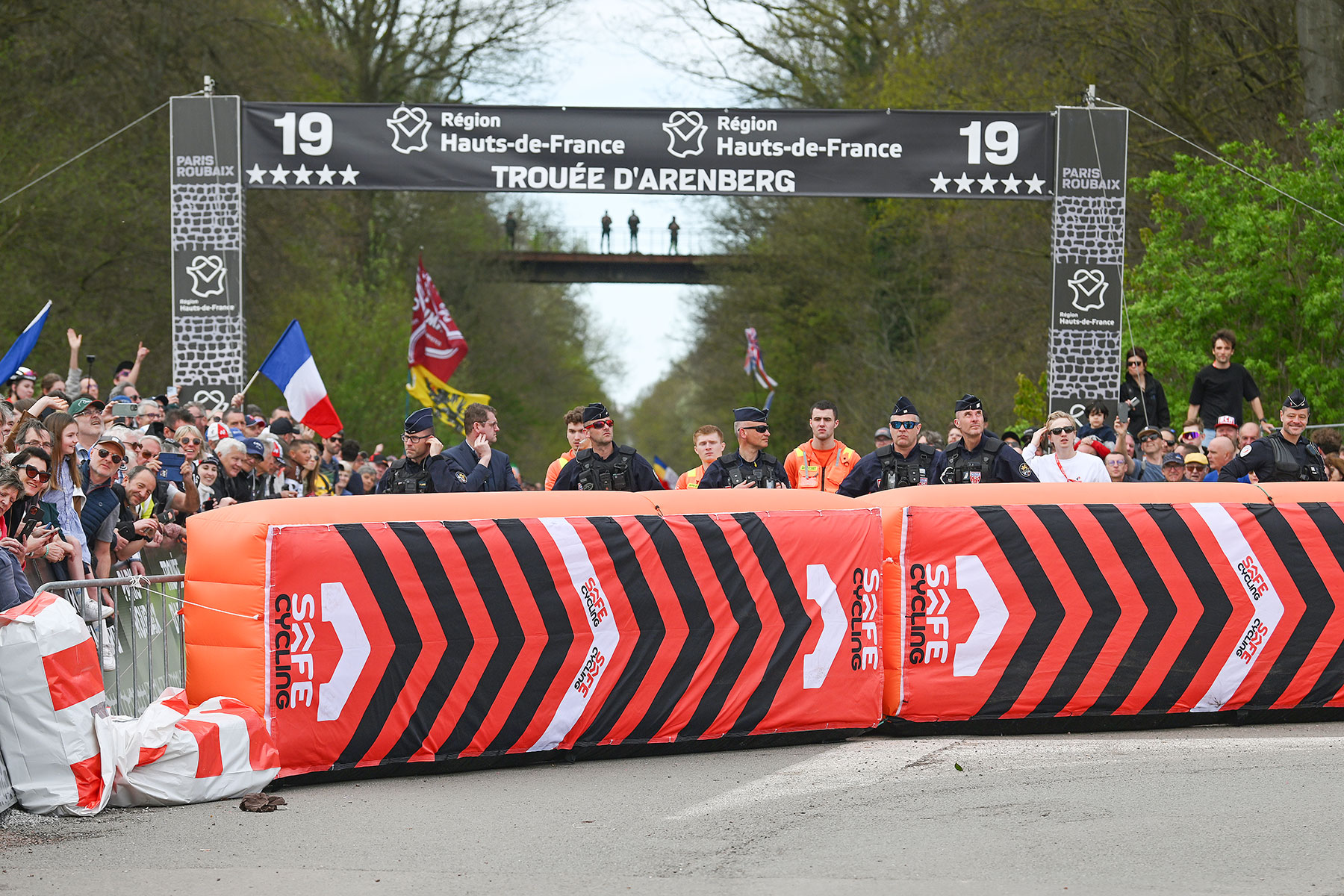
After days of considerations, social media polemics and uniformed reactions, the Forest of Arenberg chicane had little impact, except for the desired effect of making Paris-Roubaix safer.
It reduced the speed of the riders as they started the infamous sector of cobbles but attacks in the peloton had already occurred on earlier sections of cobbles and so a group of 40 or so riders rode into the Forest together, with no danger of crashing.
The creation of the chicane was no joke but concrete proof that what UCI president David Lappartient dubbed ‘safety marginal gains’ can make racing safer.
Sprinting into the Forest of Arenberg on a long straight approach road at 60kph had become a moment of crash voyeurism. But with safety now more important than a gladiatorial show, it has become anachronistic.
Does sprinting into the Forest of Arenberg really make Paris-Roubaix better? Or does it just satisfy those looking for the blood and pain of high-speed cobbled crashes?
Mathieu van der Poel still attacked and dragged a small group clear in the Arenberg but little or no blood was left on the cobbles.
The decision to introduce a chicane proved that safety can be improved and become a bigger priority without affecting the quality of the racing. The riders asked for it and race organiser ASO was not afraid to put aside tradition and make the changes.
After so many other crashes and serious injuries, surely it is now time to make similar changes in every other race to safeguard the riders and ultimately the quality and beauty of our sport. (SF)
Alpecin-Deceuninck's perfect teamwork
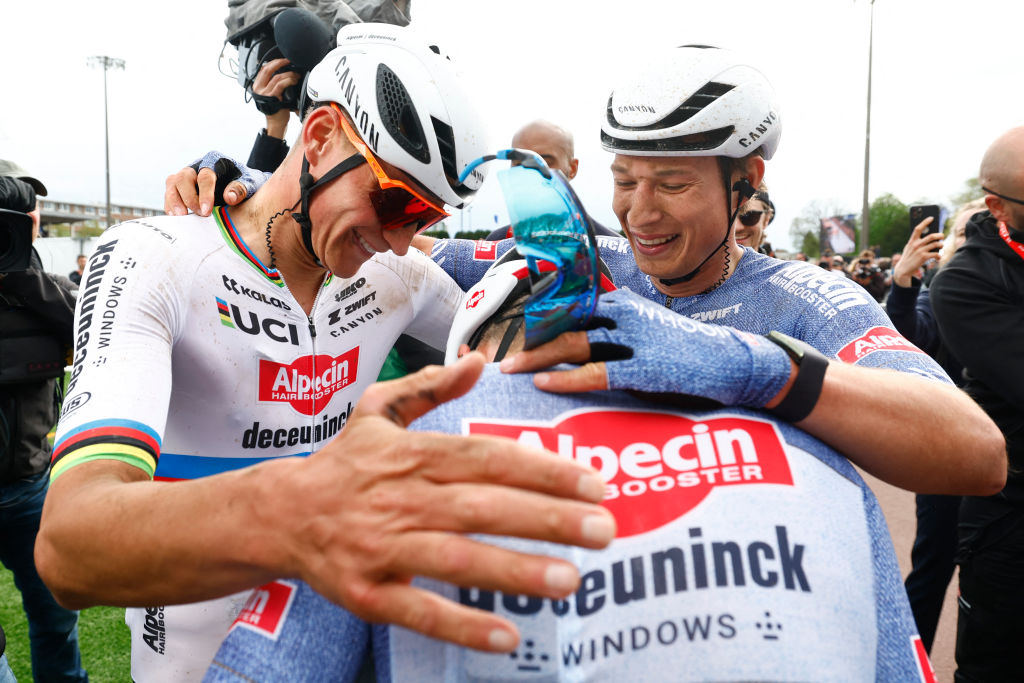
It was Alpecin-Deceuninck day at Paris-Roubaix. The Belgian team came to France with the top two finishers from 2023 in Mathieu van der Poel and Jasper Philipsen and bore the weight of expectation that another cobblestone trophy would be heading their way on Sunday.
They duly delivered on that promise, taking control of the race and blowing the peloton apart in the crosswinds before placing four men in the lead group before Van der Poel's triumphant attack at Orchies 60km out.
The world champion was unmatched, matching all pre-race predictions as he easily left his rivals behind. But so was his team, with perhaps lesser-known names such as Timo Kielich, Edward Planckaert, and Gianni Vermeersch all playing vital roles in the success.
All three were working on the front after the team had blown the peloton apart in crosswinds 150km out, while later on, Vermeersch and Philipsen stuck to the wheel of any rider daring to make a move following Van der Poel's attack.
Philipsen had the strength left to make the selection in the chase, too, and could then follow wheels before the inevitable sprint to second. As races go, there have been few examples of teamwork as successful as the masterclass Alpecin-Deceuninck displayed on Sunday. (DO)
A rare gap in Marianne Vos' palmarès
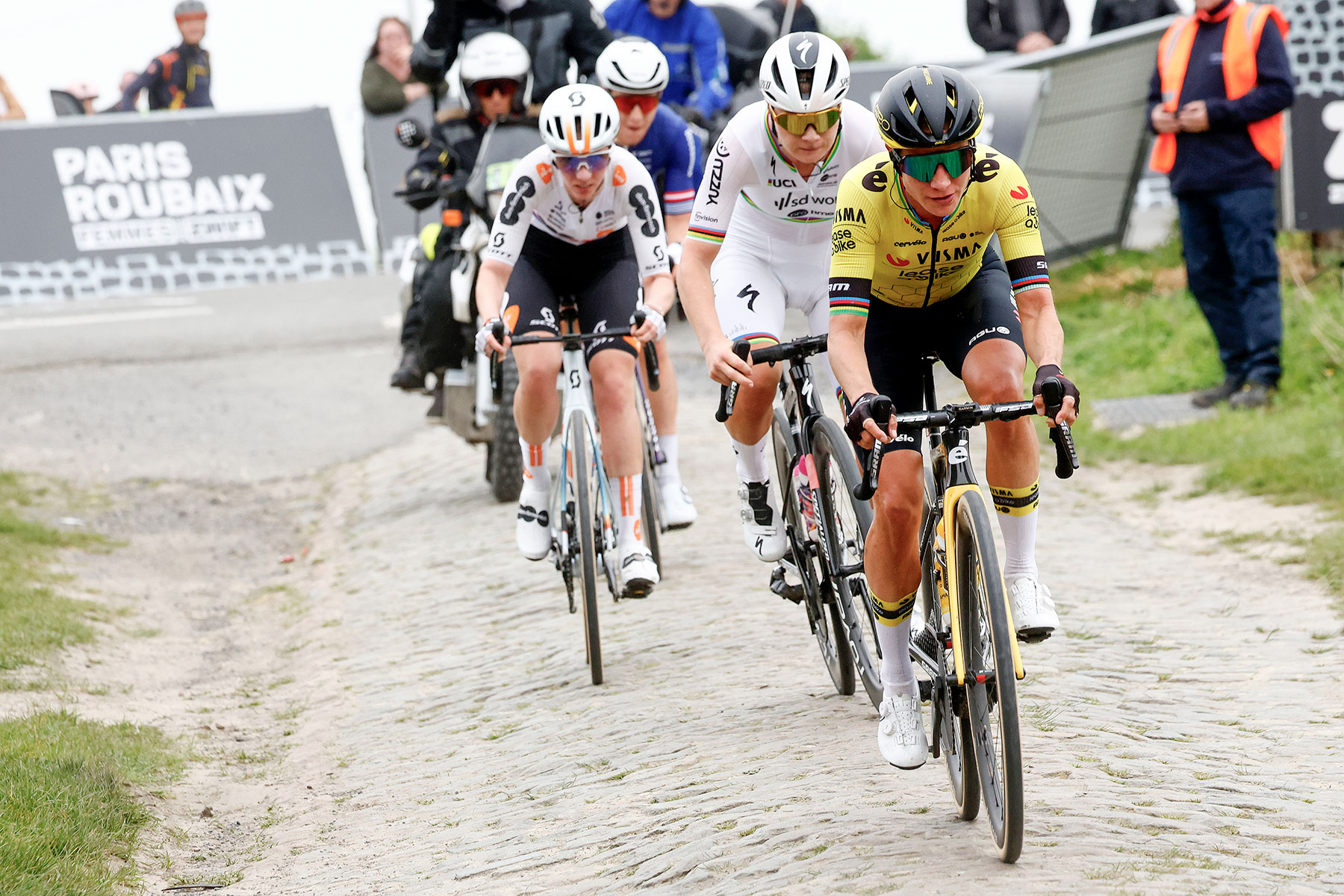
Always a pre-race favourite at in the four editions of Paris-Roubaix Femmes, Marianne Vos still hasn't been able to pull off the elusive victory at the Hell of the North.
The closest she has come to the win was finishing second place in the inaugural edition behind solo champion Lizzie Deignan. However, she didn’t get another chance to improve on that in 2022, as she tested positive for COVID-19 the morning of the event. In 2023, when the break won the day, she came 10th.
In a career that has seen Vos stand on the winner's step of the podium in nearly every major race on the international calendar and in which she has just recently secured her 250th road victory, Paris-Roubaix marks a rare gap in her palmarès.
Vos had an impressive run-in to the race, which indicated that she is back to her best after late 2023 surgery on her iliac artery. Indeed, it appeared that this could be her year to hoist the cobbled trophy above her head, crowned Queen of the Classics, especially after winning Omloop Het Nieuwsblad and Dwars door Vlaanderen.
As she raced into the winning breakaway and onto the velodrome in Roubaix with Lotte Kopecky, Elisa Balsamo, Ellen van Dijk, Pfeiffer Georgi and Amber Kraak, she appeared to be in contention as the sprint ignited onto the final straightaway.
A fast sprint then faded in the final metres as Kopecky stormed to the victory, followed by Balsamo, and she was nipped at the line by Georgi, finishing what she suggested was a disappointing fourth place - “When you’re riding for victory, and you finish fourth, it hurts.”
Vos has had a career that she defined as a collection of "memories of different highs and lows," and at 36, she appears as formidable as ever. The cycling world will be watching to see her toe the line at next year's Paris-Roubaix as she contests the Hell of the North in an attempt to claim that, so far, elusive title. (KF)
The highs and lows outside of Alpecin-Deceuninck
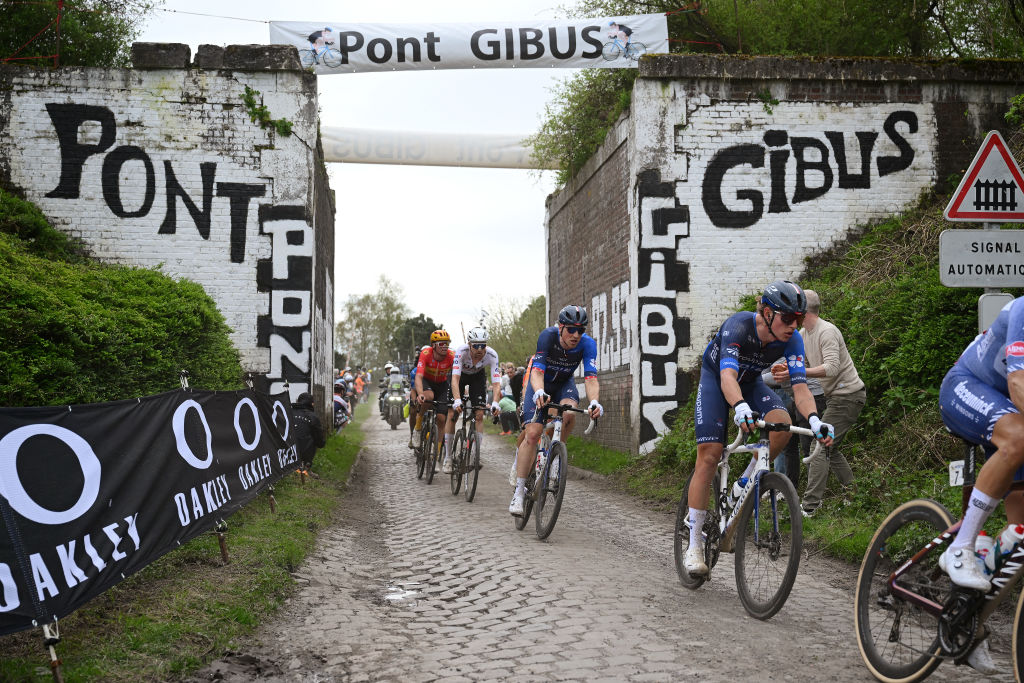
There's no denying that Alpecin-Deceuninck were the team of Paris-Roubaix 2024, controlling the race, breaking things apart and then setting up a dominant victory, but what of the others?
Several squads impressed during the 260km ride through hell, with Lidl-Trek, Groupama-FDJ, and UAE Team Emirates among the most notable rides on the day.
Of course, the injury-depleted Lidl-Trek scored a podium via Mads Pedersen, while Mathias Vacek also played a key role going deep into the race working on behalf of the Dane. One wonders how the presence of the absent Jasper Stuyven and Alex Kirsch – plus Jonathan Milan, who crashed out early on – may have changed the race.
Groupama-FDJ have the revelation of the spring in Laurence Pithie and the New Zealander was unlucky to crash out of the chase with 30km to go. Stefan Küng will be disappointed to drop out of the podium chase in the final kilometres, but fifth and seventh is a strong outcome for the French team.
Elsewhere, UAE Team Emirates can be proud of Nils Politt's fourth place, while Tim Wellens also made his presence felt with attacks and work on the front.
On the other hand, it was another Classics day to forget for Soudal-QuickStep, who now haven't won a cobbled race since Kuurne-Brussel-Kuurne in 2022. Yves Lampaert was their top finisher in 36th after an anonymous day for the Belgian team and surely a rethink is needed for future campaigns.
Ineos Grenadiers can be pleased with Tom Pidcock's 17th place after his very late call-up, though they might be wondering 'What if?' after young talent Josh Tarling's disqualification.
Finally, the 'superteam of the Classics' in recent years, Visma-Lease A Bike, conjured up impressive and unexpected rides from twins Mick and Tim van Dijke, who made their presence felt at the front with top-20 placings despite the severely weakened team the Dutch squad were forced to field. (DO)
Will the women one day take on the Arenberg?
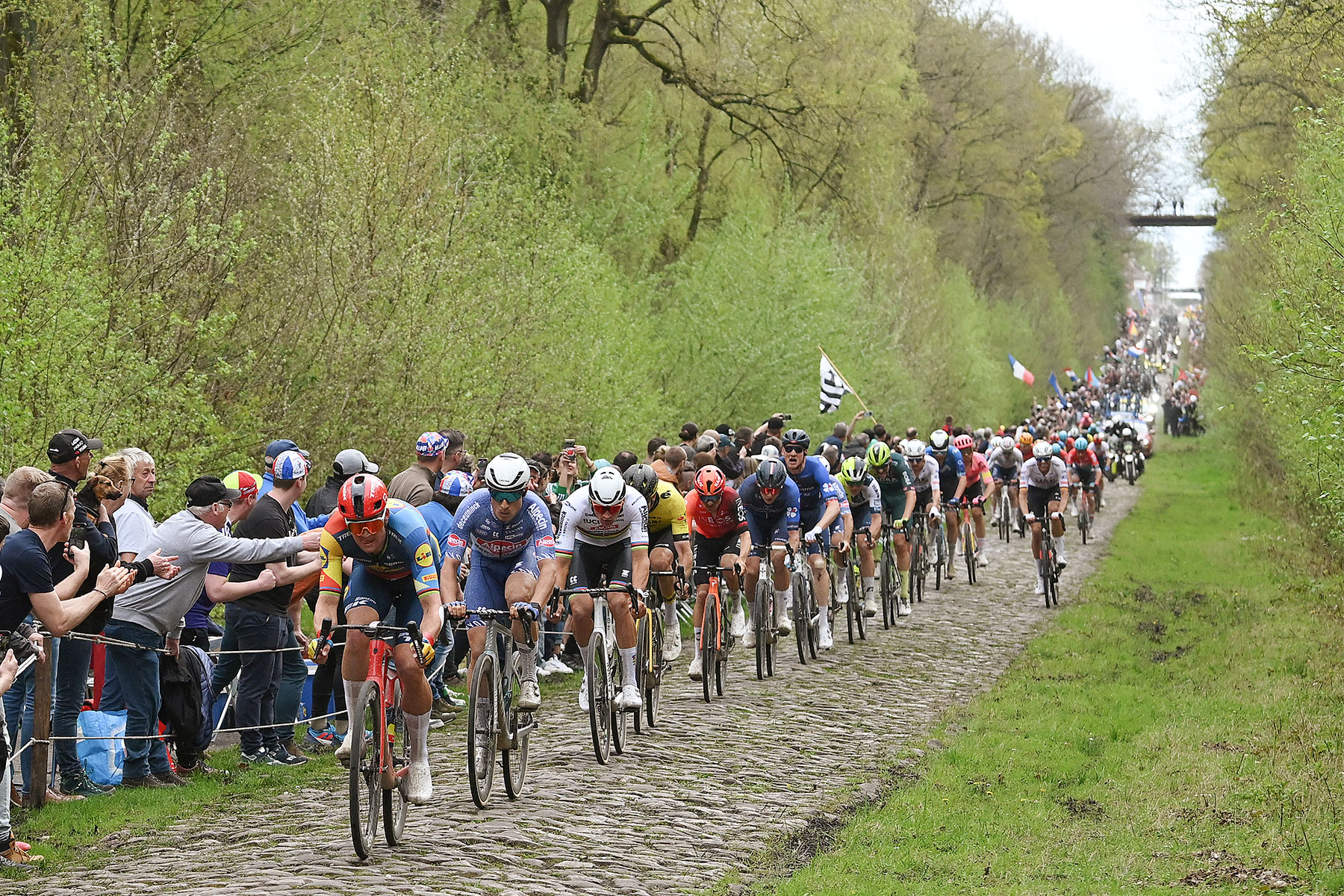
The success of the Paris-Roubaix Femmes has helped the much-needed drive towards equality in the sport. However, the difference in race routes and the absence of the iconic and often important Forest of Arenberg sector of cobbles makes it easy to say that the women’s race is not yet the equal of the men’s race.
But the long, cobbled sector is one of the most dangerous in the men’s race, so is it really needed in the women’s race? Is race route equality really needed if it is detrimental to the quality of women’s racing?
Some riders would like to see Paris-Roubaix Femmes pass through the Forest of Arenberg in a sign of equality, but others including Ellen van Dijk and Pfeiffer Georgi, who finished third this year, are not convinced due to the dangers of the cobbles and how it could impact the whole race.
With the start of Paris-Roubaix Femmes in Denain, the Forest of Arenberg would come very early in the race, perhaps creating too much of a selection too early in the race.
Race director Franck Perque told RTBF that he is not against one day including the Forest of Arenberg if the start location changes.
However perhaps the best change for Paris-Roubaix Femmes is if those racing and suffering on the cobbles, the riders, have a say on what is best for them and their sport. Why does women’s racing have to be the same as men’s racing?
Perhaps a different, more exciting women’s route can even create better racing by avoiding the historic limitations of the men’s route. (SF)
The missing men
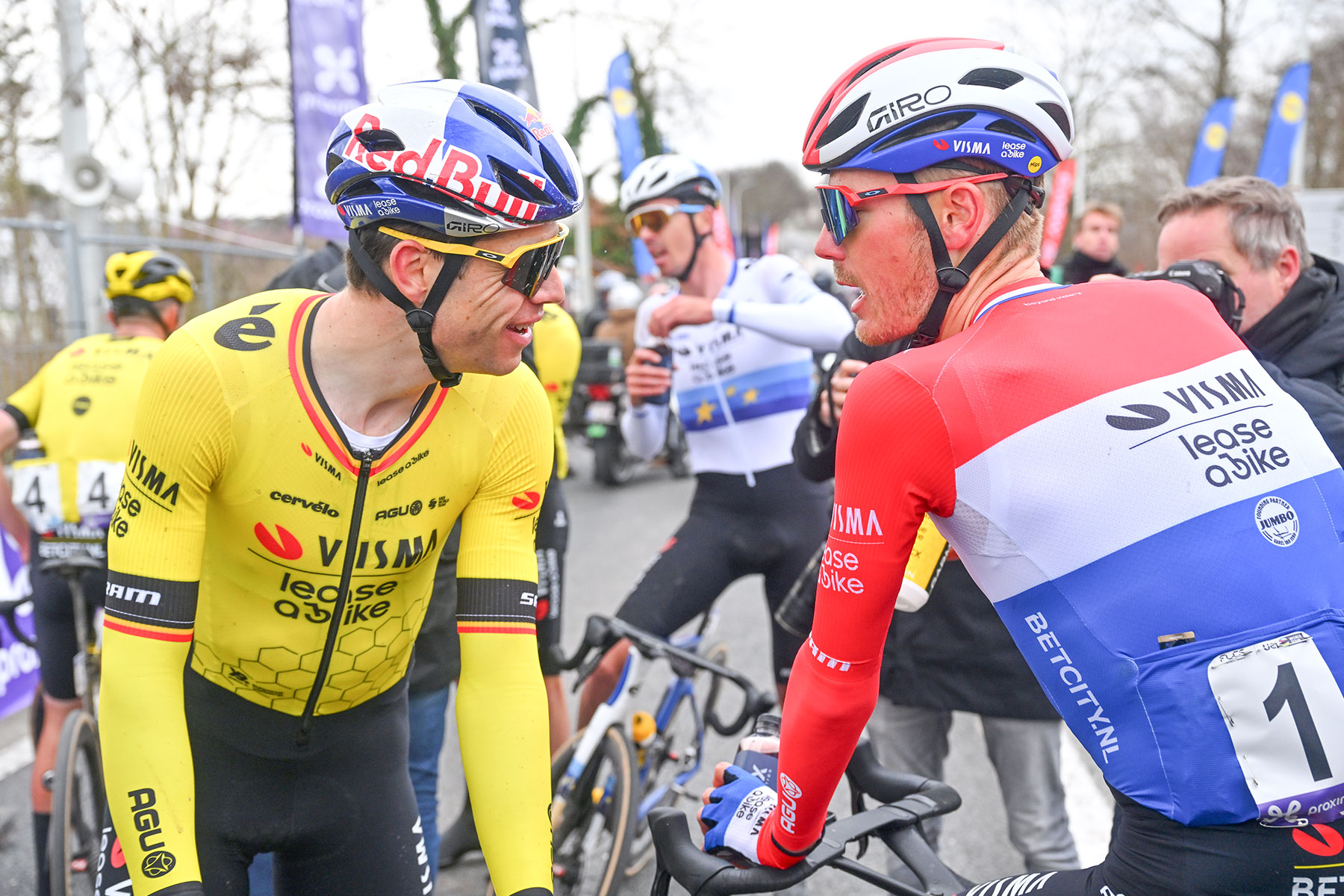
There's no denying that Sunday's men's race was shorn of several top contenders, even if few, if any, of them were ever likely to match Mathieu van der Poel's astonishing winning effort.
Of course, the big miss was Wout van Aert, Van der Poel's eternal rival and his closest competitor at last year's race sadly taken out of both Flanders and Roubaix by his crash at Dwars door Vlaanderen.
It's unfair to everybody to speculate what might have happened if Van Aert had been racing, so let's hope the pair will be fully fit to renew their cobbled Classics rivalry next spring.
But looking beyond Van Aert, there were plenty of major names missing from the start line, including his own teammates, Dwars winner Matteo Jorgenson and former Roubaix winner Dylan van Baarle.
Elsewhere, Lidl-Trek were down the injured Jasper Stuyven, while Ineos Grenadiers did without Filippo Ganna and the concussed Jhonatan Narváez. Lyme disease saw Arnaud De Lie call an early end to his Classics campaign, while his Lotto-Dstny teammate and former podium sitter Florian Vermeersch is recovering from a leg break, and Bahrain Victorious missed Matej Mohorič following his crash at Flanders.
Van Aert aside, perhaps the only name in the peloton who could match this Van der Poel is that other superstar, Tadej Pogačar. The 2023 Flanders champion has never raced Roubaix, of course, but is there any race he can't turn his hand to? Earlier this spring he said, "You'll see me in Paris-Roubaix one day for sure." We're all eagerly awaiting that day.
Compiègne never welcomes a full complement of contenders as crashes, injuries, and illness take their toll during the cobbled Classics. Here's hoping for a shorter absentee list come next April. (DO)







